Iran Press/ Iran News: Iranian food, along with culture and history, is rich in the best food in the world. Iranian kebab plays an important role in various ceremonies and home meals. Kebabs have been noted in almost every text of Persian literature and culture. In Shahnameh and Haft Khan Esfandiar and the reign of Khosrow Parviz, stories have been narrated about the hunting and grilling of Kebabs.
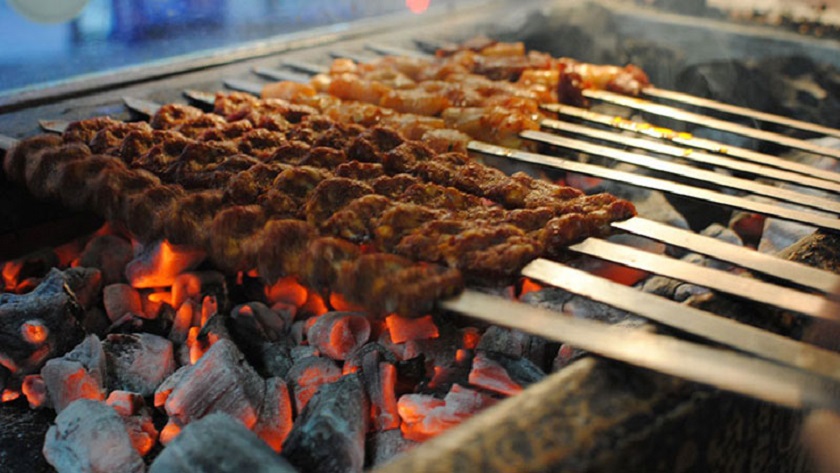 Iranian kebab is grilled on charcoal giving it a distinctive flavor
Iranian kebab is grilled on charcoal giving it a distinctive flavor
Read More: Jalebi, Tulumba; Ramadan sweets dating back to 150 years
Kebab's History:
Many sources have written about kebabs in Iran that Naser al-Din Shah Qajar was the founder of kebabs in Iran. He ordered the preparation of the kebab to imitate a Caucasian dish and with a few modifications, and after that, this usual Iranian kebab has become the original food of the Iranians.
In the writings of Mohammad Hassan Etemad-ol-Saltaneh, a politician of the Qajar court and the son of Amir Kabir's assassin, it is mentioned that the name of the first restaurant serving kebab in Iran was Nayeb and it was located in the Tehran market Served with rice and butter.
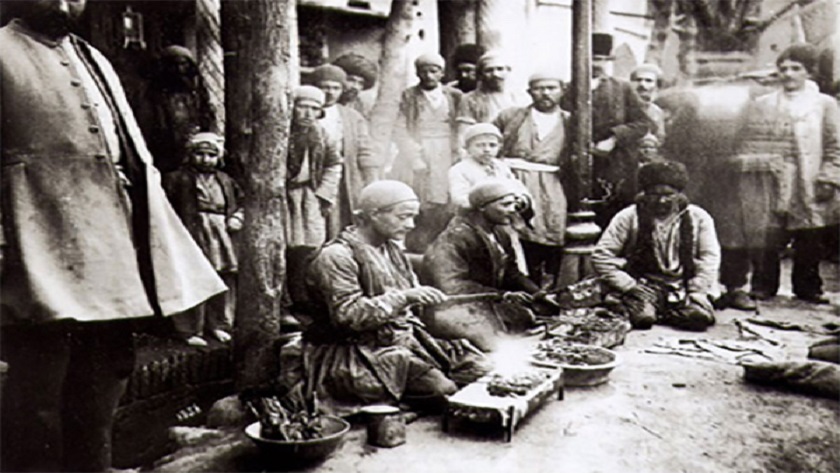 Old picture depicting cooking kebabs in an Iranian bazaar
Old picture depicting cooking kebabs in an Iranian bazaar
E'temad-ul-Saltaneh, in his notes, mentions a shop in the bazaar that like Europeans served food at tables in 1292 lunar Hijra (some 121 years ago), a reference most probably to the Nayeb restaurant as the first chelo-kabab restaurant in Tehran. However, chelo-kabab restaurants were most likely first established in the northwestern city of Tabriz which borders Caucasia. Nowadays, chelo-kabab is a national Iranian food in Tehran and other cities.
Read More: Iranian food: Abbas-Ali traditional Ash
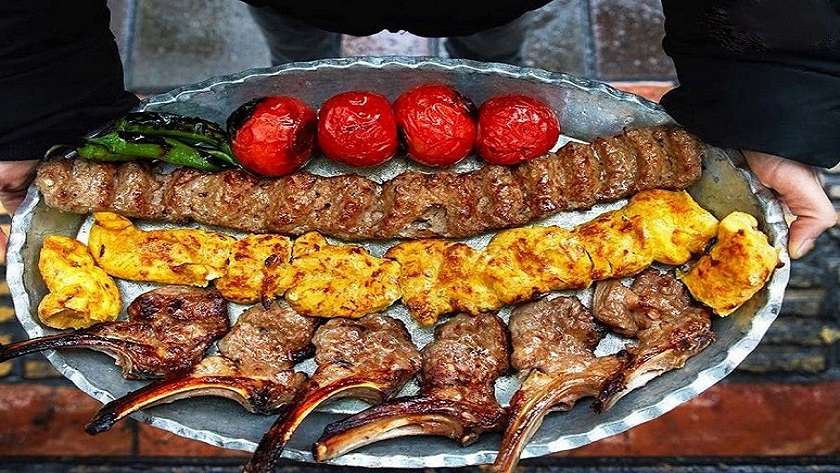 Iran is famous for its variety of kebabs
Iran is famous for its variety of kebabs
Iranian Kebab varieties:
Kebab Koobideh: Koobideh is Iran’s signature Kebab and the most famous of them all. It is made from ground lamb, beef, or chicken mixed with chopped onions. Koobideh refers to the style that which meat was prepared, originally placed on a flat stone (precisely a black flat stone) and was smashed by a wooden mallet.
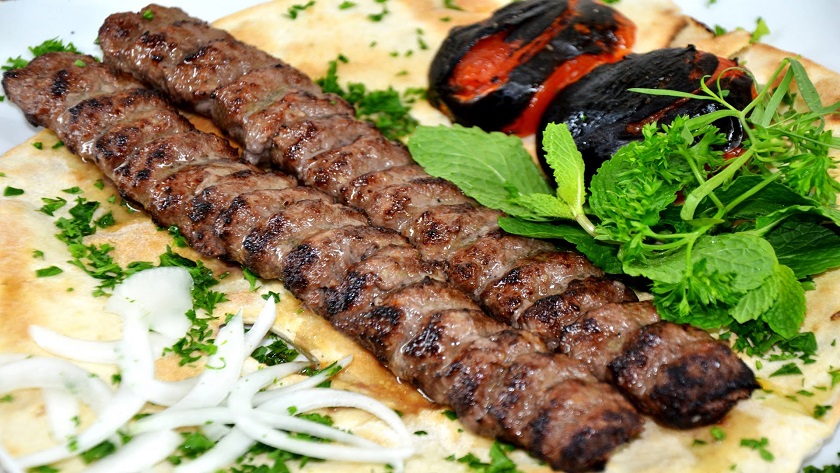 The most famous Iranian kebab; Kabab koobideh
The most famous Iranian kebab; Kabab koobideh
Chicken Kebab: Chicken Kebab is barbecued chicken with olive oil, tomatoes and saffron. This kind of kebab is easily prepared and thus among the most favorite of Iranian people.
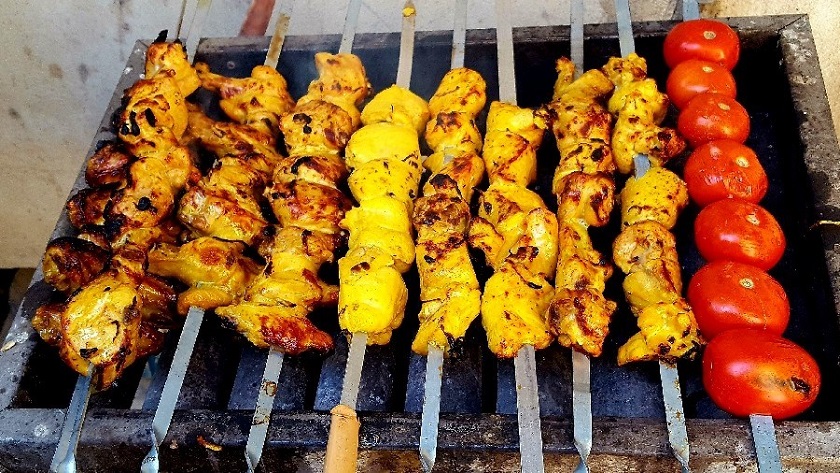 Chicken kebab is among favorits kebabs in Iran
Chicken kebab is among favorits kebabs in Iran
Barg Kebab: Barg is in fact barbecued lamb, chicken or beef kebab dish. The main ingredients of Kebab-e Barg are fillets of beef tenderloin, lamb shank, onions, saffron, olive oil and mild spices.
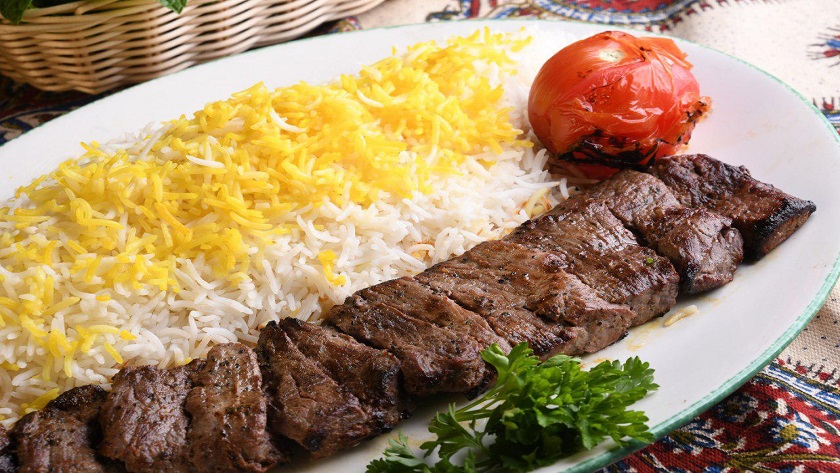 Barg kebab; lamb fillet is used in it
Barg kebab; lamb fillet is used in it
Shishlik or Shish Kebab: Shishlik meaning skewered meat is originally made of lamb chops and is popular in many countries. In Iran, it is grilled meat with bones, previously marinated in onion, olive oil and saffron.
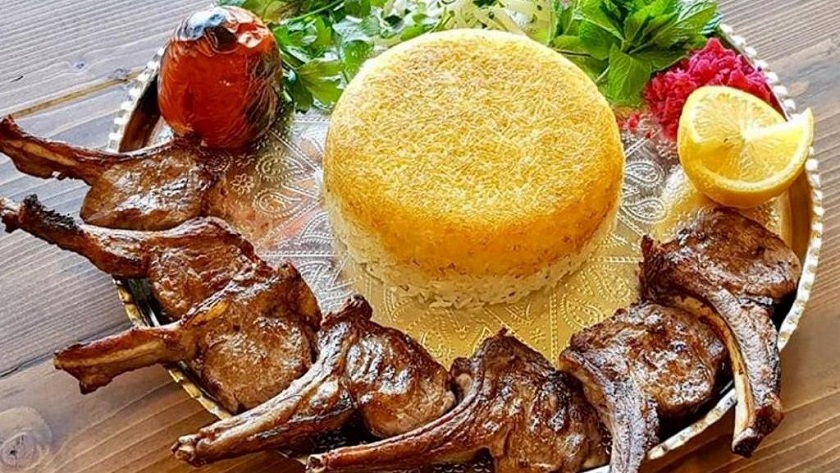 Lamb chops are used in shishlik kebab
Lamb chops are used in shishlik kebab
Torsh Kebab (sour): Torsh kebab (sour kebab) is a traditional kebab from Gilan province in Iran. It is made with beef – usually sirloin or tenderloin – marinated in a paste made of crushed walnuts, pomegranate juice or paste, chopped parsley, olive oil, and crushed garlic.
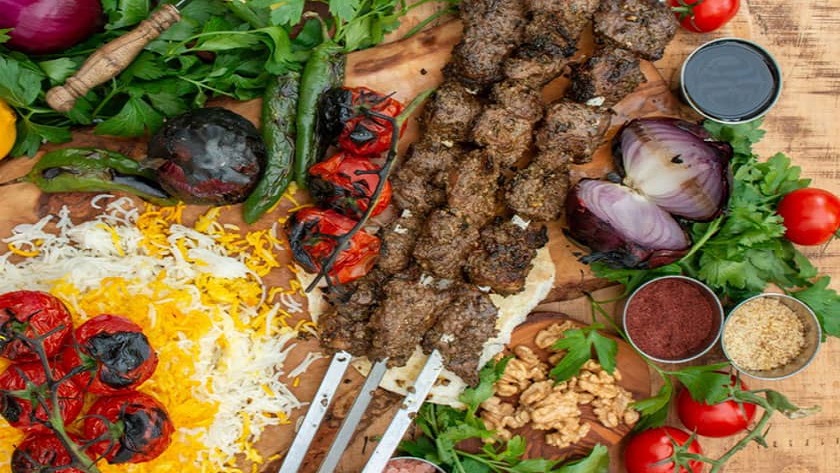 Sour kebab is originally from Gilan province
Sour kebab is originally from Gilan province
Kebab Soltani: The combination of two skewers of Kebab Barg and Kebab Koobideh is typically called soltānī, meaning King’s kebab.
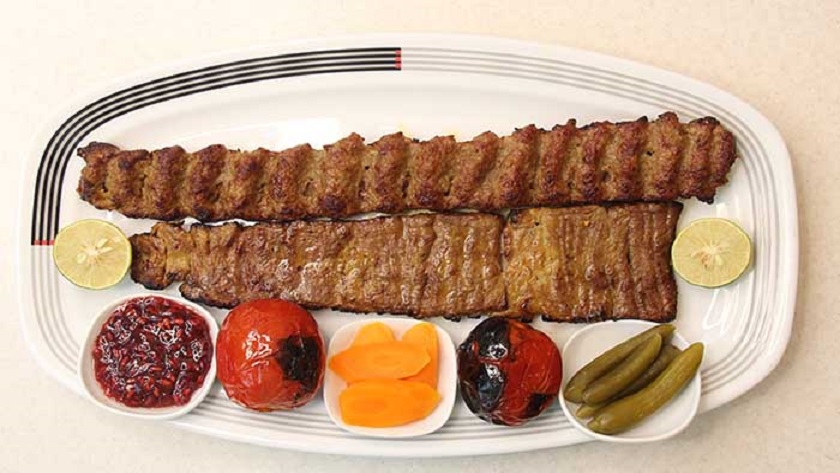 Soltani kebab
Soltani kebab
Kebab Bakhtiari: Kebab Bakhtiari is a combination of Chicken kebab and kebab served either with Persian rice or traditional bread.
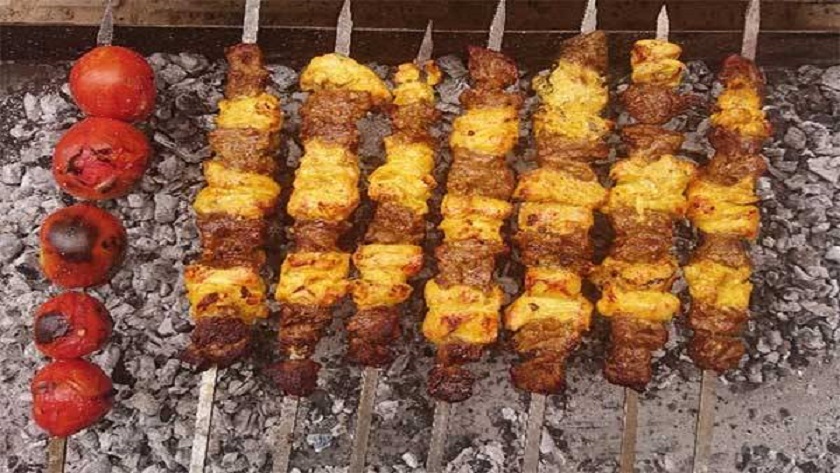 home made Bakhtiari kebab
home made Bakhtiari kebab
Chenjeh Kebab: Chenjeh is pure meat and very similar to western steaks. However, unlike most Iranian Kebabs, onion is not used in preparation. Chenjeh (meat chops) is usually made from sheep meat when it’s still soft and fresh. Chenjeh kebab is one of the most delicious Persian kebabs that is usually served in special ceremonies and occasions like wedding parties.
Read More: Khiâr sekanjabin, good refresher in sweltering summer
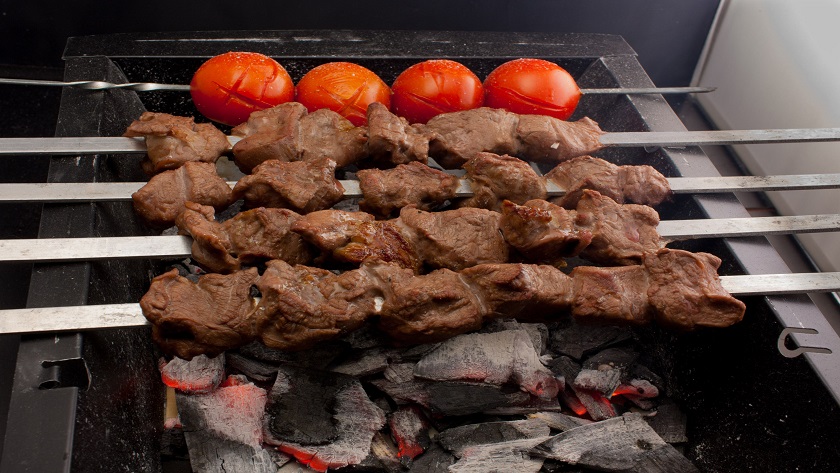 Chenjeh is made using tender meat
Chenjeh is made using tender meat
Bonab kebab: It is a type of kebab that is made of ground mutton, onion, and salt. It is named after the city of Bonab in the region of Azerbaijan in northwestern Iran, where it originated and is famous for its large size. It also is prepared on walnut wood by a cleaver.
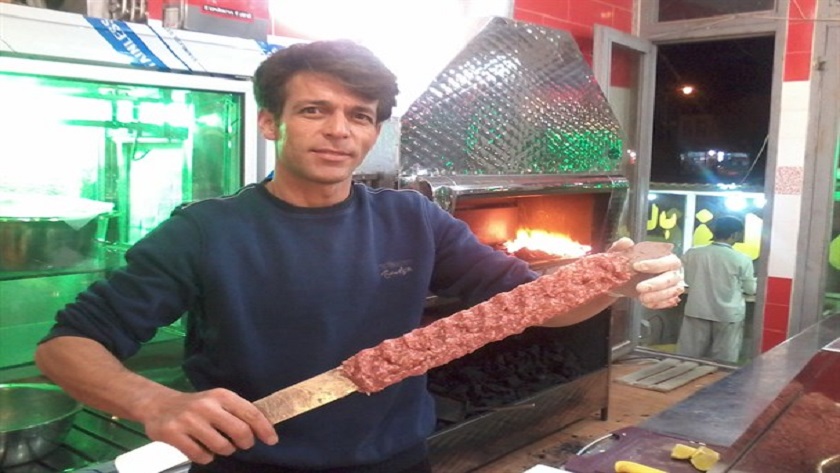 A cook preparing Bonab kebab
A cook preparing Bonab kebab
Fish Kebab: Mahi Kebab or barbecued fish is popular in both northern and southern Iran, particularly in the Caspian sea and the Persian Gulf regions. However white fish (Caspian Kutum) from the Caspian Sea is among the preferred type for the dish.
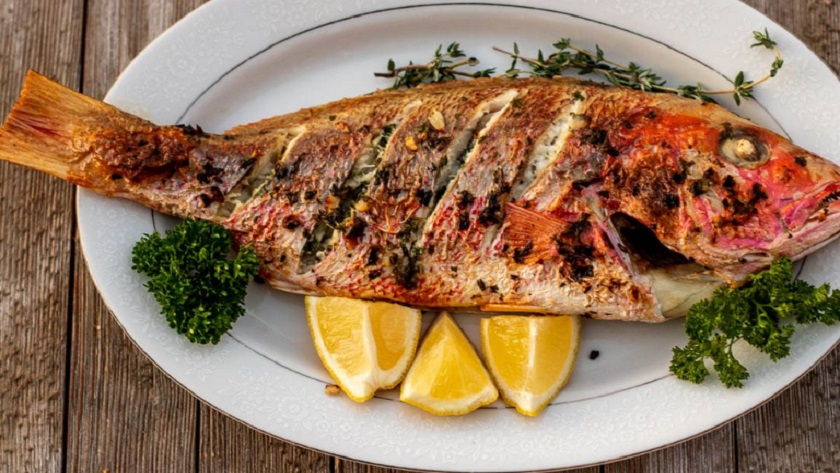 Fish kebab is suitable for those advised not to eat red meat
Fish kebab is suitable for those advised not to eat red meat
Today, a number of big and modern kabab shops were opened in the uptown and renewed the tradition of serving kabab and bread grilled right on the spot. These shops which named themselves kabab-khaneh (kabab houses) are quite different from those in the old time filled with smoke and the smell of kebab. Soon their business flourished so that they are now among the most crowded restaurants in the city. Many of them have also special ovens for baking Iranian bread and presenting fresh bread to their customers.
Read More:
Iranian Caviar; what Iran is known for
People in Iran's Ardabil prepare Soutli Polo for Nowruz
Ashkan Salehian

